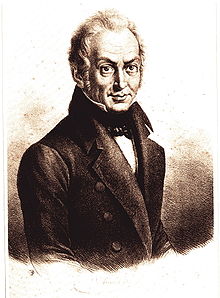- Niccolò Antonio Zingarelli
-
The title of this article contains the character ò. Where it is unavailable or not desired, the name may be represented as Niccolo Antonio Zingarelli.
Niccolò Antonio Zingarelli (4 April 1752 – 5 May 1837) was an Italian composer, chiefly of opera.
Contents
Life
Early career
Zingarelli was born in Naples, where he studied (from the age of 7) at the Santa Maria di Loreto Conservatory under Fenaroli and Speranza.
In 1789–1790 Zingarelli went to Paris to compose Antigone. He left France hurriedly at the time of the revolution and eventually returned to Italy. He was appointed maestro di cappella at Milan Cathedral in 1793, and remained there until 1794, when he took up the prestigious post of maestro di cappella at the Santa Casa, Loreto.
Rome
In 1804, Zingarelli was appointed choir master of the Sistine Chapel in Rome. In 1811 he refused profusely, as an Italian patriot, to conduct a "Te Deum" for Napoleon's son, newly born and known as King of Rome, in St. Peter's, Rome and he was taken as a prisoner to Paris. However, Napoleon père was a fan of Zingarelli's music and so quickly released him. In addition, Zingarelli was awarded a state pension.
Naples
In 1813, Zingarelli moved to Naples, where he became Director of the Conservatory. Among his notable pupils were Vincenzo Bellini, Michael Costa, Alessandro Curmi, Saverio Mercadante, and Luigi Felice Rossi. Then in 1816 he replaced Giovanni Paisiello as choir master of Naples cathedral, a position he held until his death in 1837.
He died at Torre del Greco in 1837.
Works
Opera
In his early career Zingarelli concentrated on writing opera; his debut was with the opera seria Montezuma, given at San Carlo on 13 August 1781, which aroused some interest, although the public in Naples found it too “learned”. Indeed, in 1785 Haydn revived it at the Eszterháza theatre.
Antigone, in which Zingarelli adopted some of the reform principles of French opera, won little favour in Paris, after that he eschewed innovation and contented himself with tried and tested formulae.
Zingarelli wrote 37 mainly comic operas in all in a prolific career. Between 1785 and 1803 he wrote mainly for La Scala of Milan, the first to be produced here being Alsinda. He achieved immediate success with Il mercato di Monfregoso and La secchia rapita. However Giulietta e Romeo is nowadays often considered his best opera. His last opera Berenice achieved considerable success in his lifetime after its initial production in Rome.
Surviving operas include:
- Montezuma (1781)
- Alsinda (1785)
- Ifigenia in Aulide (1787)
- Artaserse (1789)
- Antigone (1790)
- La morte di Cesare (1790)
- Pirro re di Epiro (1791)
- Annibale in Torino (1792)
- L'oracolo sannita (1792)
- Il mercato di Monfregoso (1792)
- Apelle (1793, revised as Apelle e Campaspe (1795)
- Quinto Fabio (1794)
- Il conte di Saldagna (1794)
- Gli Orazi e i Curiazi (1795)
- Giulietta e Romeo (1796)
- La morte di Mitridate (1797)
- Ines de Castro (1798)
- Carolina e Mexicow (1798)
- Meleagro (1798)
- Il ritratto (1799)
- Il ratto delle Sabine (1799)
- Clitennestra (1800;
- Edipo a Colono (1802)
- Il bevitore fortunato (1803)
- Berenice regina d'Armenia (1811)
There are 4 doubtful works; and 17 operas were lost including:
- La secchia rapita (1793)
- Baldovino (1811) (libretto by Jacopo Ferretti)
Sacred music
Being a deeply religious Catholic, Zingarelli devoted most of his attention to masses, oratorios, cantatas, and motets. For Loreto he composed 541 works, including 28 masses. In 1829 he wrote a cantata for the Birmingham Festival. Less than a month before his death he produced an oratorio, "The Flight into Egypt", and his requiem mass, composed for his own funeral, is said to embody his most devotional church style.
Sources
- Caraci, Maria (1988). "Niccolò Zingarelli tra mito e critica". Nuova rivista musicale italiana 22: pp. 375–422.
External links
- Free scores by Niccolò Antonio Zingarelli in the Choral Public Domain Library (ChoralWiki)
- Free scores by Niccolò Antonio Zingarelli at the International Music Score Library Project
 This article incorporates text from a publication now in the public domain: Herbermann, Charles, ed (1913). Catholic Encyclopedia. Robert Appleton Company.Categories:
This article incorporates text from a publication now in the public domain: Herbermann, Charles, ed (1913). Catholic Encyclopedia. Robert Appleton Company.Categories:- 1752 births
- 1837 deaths
- People from Naples
- People from Torre del Greco
- Opera composers
- Neapolitan school composers
Wikimedia Foundation. 2010.

